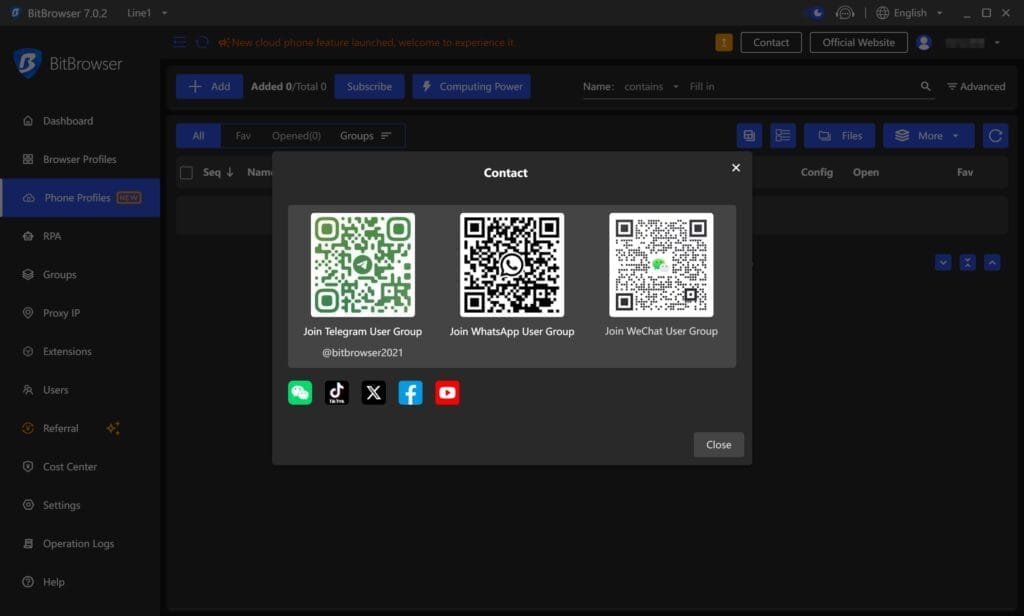
Imagine a future where your digital identity is as unique as your fingerprint. A future where every click, every scroll, and every purchase is meticulously tracked and analyzed. This isn't science fiction; it's the reality we're rapidly moving towards, thanks to the rise of fingerprint browsers.
Fingerprint browsers have already revolutionized the way e-commerce businesses operate, enabling them to create multiple online identities, conduct in-depth market research, and personalize customer experiences. But what does the future hold for this technology? Let's dive in.
Hyper-Personalized Shopping Experiences
As fingerprint browsers become more sophisticated, we can expect to see a surge in hyper-personalized shopping experiences. Every interaction a customer has with an online store will be meticulously recorded and analyzed, allowing businesses to create highly tailored product recommendations and marketing campaigns.
- Real-time personalization: Imagine walking into a physical store where the shelves automatically adjust to display products you're most likely to purchase, based on your past browsing history and preferences. Fingerprint browsers will enable e-commerce platforms to replicate this level of personalization online.
- Dynamic pricing: Prices could fluctuate based on a customer's perceived willingness to pay, determined by their browsing history and purchasing patterns. While this raises ethical concerns, it could also lead to more competitive pricing and greater consumer satisfaction.
Enhanced Fraud Detection and Prevention
Fingerprint browsers are also proving to be a powerful tool in the fight against online fraud. By analyzing the unique digital fingerprint of each user, businesses can identify suspicious activity and prevent fraudulent transactions.
- Real-time fraud detection: As soon as a fraudulent transaction is attempted, the system can flag it and take appropriate action, such as blocking the account or requiring additional verification.
- Biometric authentication: Combining fingerprint browsing with biometric authentication methods, such as facial recognition or voice identification, could create an even more secure online shopping experience.
The Rise of the Privacy-Aware Consumer
As consumers become more aware of the data being collected about them, they will demand greater privacy protections. This will force e-commerce businesses to strike a delicate balance between personalization and privacy.
- Privacy-enhancing technologies: To address these concerns, businesses may adopt privacy-enhancing technologies, such as differential privacy and federated learning, which allow for data analysis without compromising individual privacy.
- Transparent data practices: Consumers will expect greater transparency from businesses regarding how their data is collected, used, and stored. This could lead to more stringent data privacy regulations.
Challenges and Ethical Considerations
While the potential benefits of fingerprint browsers are significant, there are also challenges and ethical considerations to address.
- Bias and discrimination: If not used carefully, fingerprint browsers could perpetuate existing biases and discrimination. For example, algorithms trained on biased data could make discriminatory recommendations.
- Data breaches: The vast amounts of personal data collected by fingerprint browsers make them a prime target for hackers. Businesses must implement robust security measures to protect this sensitive information.
- Surveillance capitalism: There is a growing concern that fingerprint browsers could be used to create detailed profiles of individuals, which could be exploited by governments and corporations for surveillance purposes.
The Road Ahead
The future of fingerprint browsers is bright, but it is also fraught with challenges. As this technology continues to evolve, it is essential for businesses, policymakers, and consumers to work together to ensure that it is used ethically and responsibly. By addressing the potential risks and embracing the opportunities, we can create a more personalized, secure, and equitable digital economy.
In conclusion, fingerprint browsers are poised to revolutionize the e-commerce landscape. By enabling hyper-personalized shopping experiences, enhancing fraud detection, and addressing privacy concerns, this technology has the potential to shape the future of online commerce. However, it is crucial to approach this technology with caution and to address the ethical implications associated with its use.
BitBrowser: Multi-Account Management with Complete Isolation
BitBrowser is a powerful tool for managing multiple accounts and browser windows while ensuring complete isolation and security. Each window can simulate an independent computer environment, complete with different IP addresses, to prevent any association and avoid account bans. Based on the Chrome and Firefox cores, BitBrowser offers deep physical simulation of real device information and highly anonymous proxy IP addresses. The browser ensures that each window is 100% isolated, with no cross-associations, and provides clean and reliable proxy IPs to maintain a pristine browsing environment.


Leave a Reply